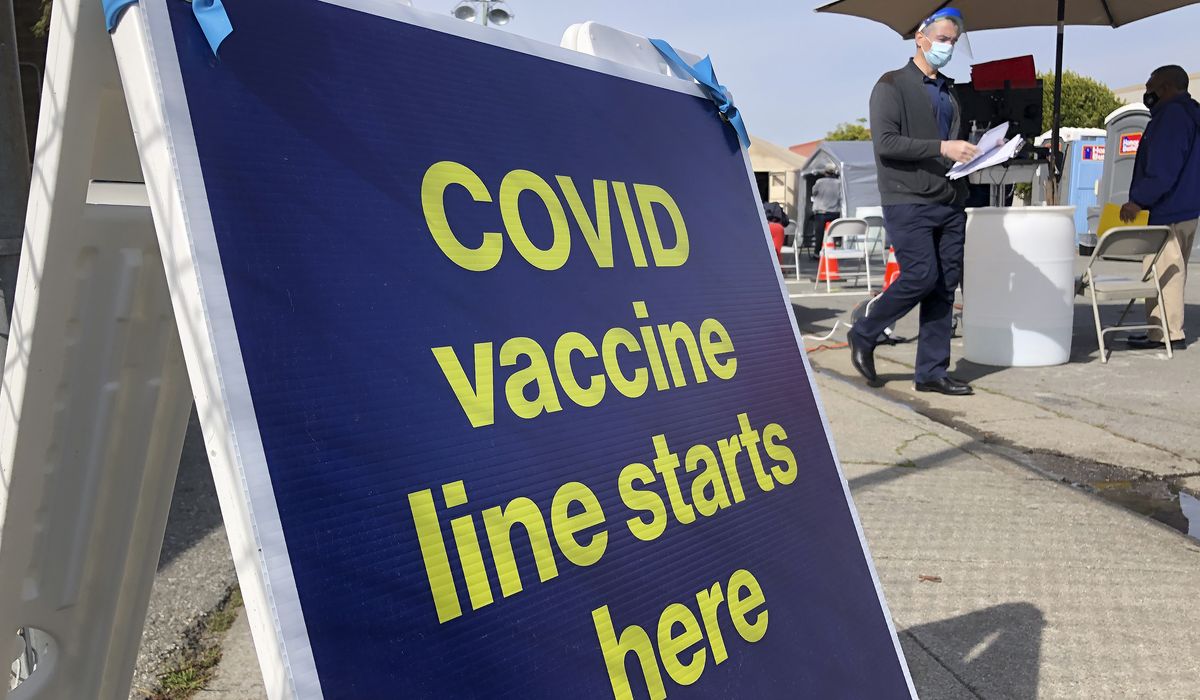
COVID-19 breakthrough infections are increasing as vaccine effectiveness rates drop below 50% and the winter virus season fast approaches, threatening the vulnerable and promising more workforce disruption amid a nationwide labor shortage.
The surge is forcing President Biden and governors to fight the pandemic on two fronts ahead of the holidays, trying to persuade skeptics to get vaccinated while using booster shots to backfill immunity in those who came forward early in the rollout but now have waning antibodies.
“Don’t overanalyze this, let’s get as many folks boosted before the holidays as we can,” New Jersey Gov. Phil Murphy, a Democrat, said Monday.
The federal government tracks only the most severe breakthrough infections and gets a snapshot of what’s going on nationwide. Some states do a more comprehensive job tracking breakthroughs.
Massachusetts reported 4,608 cases in vaccinated people in the most recent reporting week, up 44% from the prior week as the New England cold sets in.
In Minnesota, 5 in 100,000 vaccinated people were hospitalized for COVID-19 at the start of October versus 0.4 per 100,000 around Independence Day. Vaccinated people accounted for roughly 40% of the 483 COVID-19 deaths in the state from early September to early October.
About 1 in 5 people hospitalized in Colorado is fully vaccinated, indicating that unvaccinated people occupy the lion’s share of beds and fueling Gov. Jared Polis’ pleas for people to shore up their protection with an extra shot.
Multiple factors are behind the trend, including “the greater infectivity of [the delta variant], some decrease in immunity over time from vaccination and the generally high levels of COVID-19 circulating in the community — principally among the unvaccinated,” said Dr. Daniel Kuritzkes, chief of the division of infectious diseases at Brigham and Women’s Hospital in Boston.
The messenger-RNA vaccines from Pfizer and Moderna were rolled out in December and a one-shot Johnson & Johnson vaccine joined them in late February.
They have generally held up against hospitalization and death, but the fast-moving delta variant of the virus struck in late summer, severely challenging the vaccines’ power as antibodies waned over time.
A massive study involving 780,000 U.S. veterans published this month in the journal Science found protection against any infection at all plummeted from 87.9% in February to 48.1% by October.
Pfizer’s protection dropped from 86.9% to 43.3%, and Moderna’s from 89.2% to 58%. Protection against infection from the J&J vaccine plummeted from 86.4% in March to 13% in September, according to researchers from the Public Health Institute, the Veterans Affairs Medical Center and the University of Texas Health Science Center.
The J&J shot was 73% effective against death for those under age 65, while the Pfizer and Moderna shots were 84.3% and 81.5% effective, respectively.
The vaccines’ ability to stave off some degree of infection had been a key selling point for the Biden administration, which is pushing mandates on federal workers, contractors and health care workers. The administration also is waging a court battle over its push to require the shots or regular testing at large companies.
“Obviously, no vaccine is 100% protective against infection, but you do go a long way,” Dr. Anthony Fauci, director of the National Institute of Allergy and Infectious Diseases, said last week in describing the scientific goals of the mandates.
Business groups say the mandates, coupled with mounting breakthrough cases and other infections, will be a disruptive force in a nation facing big worker shortages.
“We particularly are concerned about the impact on absenteeism, and we’re already facing a huge workforce crunch,” said Ed Egee, vice president of government relations and workforce development at the National Retail Federation.
Mr. Egee estimated the retail sector needs to fill nearly 700,000 jobs as multiple sectors scramble for workers.
“We don’t want to see the [virus] numbers going back up for any reason, particularly as we head into the holiday season,” he said.
Fears about breakthrough infections burst into view following the July 4 holiday with a study of Cape Cod revelers reporting that three-quarters of the 469 people infected were fully vaccinated and seemed to have enough virus in their noses to transmit it, too.
Who’s tracking breakthroughs
The Centers for Disease Control and Prevention tracks some but not all breakthrough infections, making it difficult to parse in real-time what share of infection in the U.S. is in the vaccinated, though local data consistently show unvaccinated people are at higher risk.
King County in Washington, which includes Seattle, tracks relative risk and found unvaccinated people were 3 times more likely to be infected, 12 times more likely to be hospitalized and 13 times more likely to die from COVID-19.
Colorado data show vaccinated people are 3.8 times less likely to get COVID, 9.7 times less likely to land in the hospital from the disease and 12.4 times less likely to die from it. The state was seeing about 146 cases per 100,000 people in vaccinated people and 560 cases per 100,000 in the unvaccinated as of the week of Oct. 24.
Fully vaccinated Minnesotans made up 197 of the 483 deaths from Sept. 5 to Oct. 9. That’s a minority, though an increase from the 29% share in the previous four months, according to the Minneapolis Star-Tribune, which crunched the numbers after a recent data release from state officials.
Scientists caution that the percentage of infections, hospitalizations and deaths labeled as breakthroughs will rise relative to the percentage occurring among the unvaccinated simply because a broader swath of the population is getting immunized. If every single person were vaccinated, the raw numbers of infections, hospitalizations and deaths would go down, but they would all be labeled as breakthrough events.
The trend is forcing the White House into an odd posture, promoting initial vaccination as the most important part of the pandemic fight while lobbying for boosters to tamp down bad outcomes in the vulnerable and decrease the overall level of infection.
“As highlighted by the discussions of both the FDA and CDC advisory committees, I think many medical experts feel that boosting in the most vulnerable populations makes sense, but the case has not been made for widespread boosting of all,” Dr. Kuritzkes said. “I also think that most of us believe that vaccinating the 20-30% of the U.S. population that remains unvaccinated is far more important than widespread boosting of the already vaccinated.”
Inflection point
The booster debate comes at a critical juncture for the nation’s health and economy. Coronavirus cases are starting to pick up again around the country, generally hovering around 80,000 per day, and the steady drop in hospitalizations has flat-lined. The delta wave that smacked the South in late summer is moving into other parts of the country, including the Mountain West and parts of the Upper Midwest and New England.
Experts don’t expect this winter to be as disastrous as last year when the vaccine rollout was in its infancy. But Mr. Biden and his team are nervous about a mix of studies that, while dizzying at times, forge a clear verdict: The vaccines are losing their efficacy.
National Institutes of Health Director Francis Collins last week said Israel, which got an early jump on vaccinations, got a snapshot of the Pfizer vaccine’s weakening defenses back in July.
“Among individuals 60 years or older who were fully vaccinated last January, the number of confirmed breakthrough infections was 3.3 per 1,000 people during the three weeks of the study,” Dr. Collins wrote in a blog post. “Those who were vaccinated in February and March had lower infection rates of 2.2 per 1,000 and 1.7 per 1,000, respectively.”
National data from the CDC on the delta wave in late summer show 113 per 100,000 vaccinated persons caught COVID-19 in early September compared to 12 per 100,000 around Independence Day.
The Advisory Committee on Immunization Practices received a September presentation from the CDC that showed the Pfizer shots’ efficacy against symptomatic infection waned from about 95% to about 65% and the Moderna shots dwindled from about 95% to 70%. The J&J version hovered near 60% amid the delta wave, though far fewer people received the one-shot vaccine, and a second dose of the J&J vaccine could bump protection up to over 90%.
The Food and Drug Administration ultimately greenlighted boosters for all J&J recipients and subgroups of Pfizer and Moderna recipients, but it could bless boosters-for-all by Thanksgiving amid mounting calls to shore up defenses against the virus.
The two-dose vaccine from Pfizer was the first to be cleared for emergency use at the end of 2020. Now, the drugmaker wants to offer third doses to all adults based on new trial data from 10,000 participants in the U.S., Brazil and South Africa with a median age of 53 and who completed a two-dose series with the Pfizer vaccine.
During the study, there were five cases of COVID-19 in the booster group and 109 cases in the nonbooster group, for a relative efficacy of 95%.
“Infections are starting to rise. Hospitalizations are inching up. The holidays are approaching,” tweeted Ashish K. Jha, dean of the Brown University School of Public Health. “The data is becoming increasingly clear. It is time for every adult 6 months out to get a booster.”
State officials are getting antsy. They’re unhappy with the patchwork of federal rules and wish things were streamlined.
“Nearly 4 million New Jersey residents are eligible for boosters right now. However, only 24% of those who are eligible have actually received a booster,” New Jersey Health Commissioner Judith M. Persichilli said. “Those who haven’t received a booster yet may not understand that their immunity has weakened since they received their primary vaccine series.”
Arkansas, Colorado, New Mexico and California aren’t waiting. They told their residents to get a booster if they want one, defying the federal process that hasn’t opened the floodgates yet.
“Everybody should get the booster after six months,” Mr. Polis, a Democrat, told Coloradans on CBS’ “Face the Nation” over the weekend. “The data is incredibly clear that it increases your personal protection level. That’s why my parents got it. I got it. My family members got it.”
‘Bored instead of sick’
While regulators debate boosters-for-all, some doctors say the public should get used to the virus as something that will ping around in the background, akin to nasty colds and the seasonal flu, and will reach the vaccinated at some point.
“I think we really need to emphasize the point of what the vaccine’s intention was keeping [people] out of the hospital and safe,” said Dr. Panagis Galiatsatos, an assistant professor at Johns Hopkins School of Medicine in Baltimore who noted a dramatic decrease in ICU admissions for COVID-19. “Like a bulletproof vest doesn’t stop bullets from injuring you, just from killing you — the same with the vaccine.”
COVID-19 wasn’t a prime suspect when Caren Gordon Cohen felt a tickle in her throat on her first trip back to the District of Columbia after having moved to Colorado in the early months of the pandemic.
She had been careful during the coronavirus crisis, wearing a mask and getting fully vaccinated with the Pfizer-BioNTech shots in April before the mid-September jaunt to her old stomping grounds.
“I thought, ‘Ah, D.C. allergies,’” she said, recalling a Sunday night following a “super social” weekend that involved 11 friends and some outdoor dining after landing in the nation’s capital that Friday.
A runny nose the next morning prompted her to get the first of a series of tests confirming she was positive for the virus, upending her trip and confining her to a Georgetown hotel.
Her friends didn’t fall ill, but Ms. Cohen felt pretty bad for four days — a 102.5-degree fever, symptoms akin to the flu. She considered herself “lucky to be bored instead of sick” for the rest of her 10-day isolation.
“I watched a lot of bad TV,” said Ms. Cohen, 53, who coaches and advises business executives. “I think I watched ‘The Devil Wears Prada’ three different times. Not proud of that, but I think it did happen.”
Ms. Cohen, like many Americans, got her vaccine but still caught the virus.
White House press secretary Jen Psaki joined those ranks on Halloween, keeping her off the podium for 10 days. And Texas A&M University President M. Katherine Banks “is extremely disappointed to miss the many university activities scheduled for the next 10 days” after testing positive Friday, according to Greg Hartman, the university’s vice president and chief operating officer.
For her part, Ms. Cohen said she knows people back home who caught the virus pre-vaccine and “it sounded considerably worse than what I had.”
“I do think the vaccine gave us all so much comfort,” the business coach said. “I felt like I had been careful. I was vaccinated, I’m in good health, I just really didn’t think it was going to happen to me.”
However, she said, “I feel very fortunate. I didn’t panic about the severity of the illness and fortunately, I was not that sick for very long.”
Ms. Cohen plans to get a booster shot, but her doctors advised her to wait until at least January to give her immune system a respite. There is mounting evidence that people who survive a natural infection, combined with vaccination, have very good protection against the virus.
“I hope so,” Ms. Cohen said. “I feel like I paid for it.”








